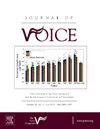吸气肌训练对透明质酸喉头成形术后良性病变患者声门闭合和主观嗓音效果的叠加效应
IF 2.5
4区 医学
Q1 AUDIOLOGY & SPEECH-LANGUAGE PATHOLOGY
引用次数: 0
摘要
目的:对于声门发育不全患者,注射喉成形术是一种快速有效的治疗方法,与嗓音治疗相辅相成。一些研究表明,呼吸肌训练对嗓音疾病患者也有帮助。但据报道,呼吸肌训练对声门发育不全患者的效果有限,是否能在标准治疗后带来更多益处还需进一步评估。我们旨在研究吸气肌训练对已接受透明质酸注射治疗的声门发育不全患者的声门闭合和患者报告的嗓音质量的影响:研究设计:回顾性观察研究:我们纳入了46名接受过透明质酸注射治疗的声门发育不全患者。其中 20 人接受了为期三个月的吸气肌训练。在训练前后,我们根据正常化声门间隙面积和弓形指数测量了患者声门状态的变化,并根据嗓音障碍指数10和嗓音结果调查测量了患者的嗓音生活质量:结果:接受吸气肌训练的患者在所有评分方面都有较高的改善几率。得分变化的几率范围从 2.5 到 6.3 不等,得分百分比变化的几率范围从 3.8 到 22.2 不等。值得注意的是,在对声带病程、体重指数和 BMI 以及胃食管反流病史进行调整后,训练对正常化声门间隙面积评分百分比变化的影响是显著的(P= 0.0127):结论:吸气肌训练可改善注射喉成形术后的声门间隙,可应用于临床实践。本文章由计算机程序翻译,如有差异,请以英文原文为准。
The Additive Effectiveness of Inspiratory Muscle Training on Glottic Closure and Subjective Voice Outcomes of Patients With Benign Lesion After Hyaluronic Acid Laryngoplasty
Objectives
For patients with glottic insufficiency disease, injection laryngoplasty is a rapid and efficient management option that complements voice therapy. Some studies have indicated that respiratory muscle training may also show promise in patients with voice disorders. However, the effect of respiratory muscle training in patients with glottic insufficiency was reported to be limited, and whether it provides additional benefit after standard management requires further evaluation. We aimed to investigate the effectiveness of inspiratory muscle training on glottis closure and patient-reported voice quality in glottic insufficiency patients who had been treated with hyaluronic acid injection.
Study Design
Retrospective observational study.
Methods
We included 46 patients with glottic insufficiency who had undergone hyaluronic acid injection. Twenty of them had undergone inspiratory muscle training during three months. We measured patients’ changes in glottic status according to the normalized glottal gap area and bowing index, as well as voice quality of life according to the voice handicap index 10 and the voice outcome survey, before and after training.
Results
Patients who underwent inspiratory muscle training had higher odds of experiencing better improvement in all scores. The range of odds ratios ranged from 2.5 to 6.3 for changes in scores, and from 3.8 to 22.2 for changes in score percentages. Of note, the effect of training on percentage changes in the normalized glottal gap area score was significant (P= 0.0127) after adjustment for the duration of vocal disease, body mass index and BMI, and history of gastroesophageal reflux disease.
Conclusions
Inspiratory muscle training can improve the glottal gap after injection laryngoplasty, and may be applied in clinical practice.
求助全文
通过发布文献求助,成功后即可免费获取论文全文。
去求助
来源期刊

Journal of Voice
医学-耳鼻喉科学
CiteScore
4.00
自引率
13.60%
发文量
395
审稿时长
59 days
期刊介绍:
The Journal of Voice is widely regarded as the world''s premiere journal for voice medicine and research. This peer-reviewed publication is listed in Index Medicus and is indexed by the Institute for Scientific Information. The journal contains articles written by experts throughout the world on all topics in voice sciences, voice medicine and surgery, and speech-language pathologists'' management of voice-related problems. The journal includes clinical articles, clinical research, and laboratory research. Members of the Foundation receive the journal as a benefit of membership.
 求助内容:
求助内容: 应助结果提醒方式:
应助结果提醒方式:


